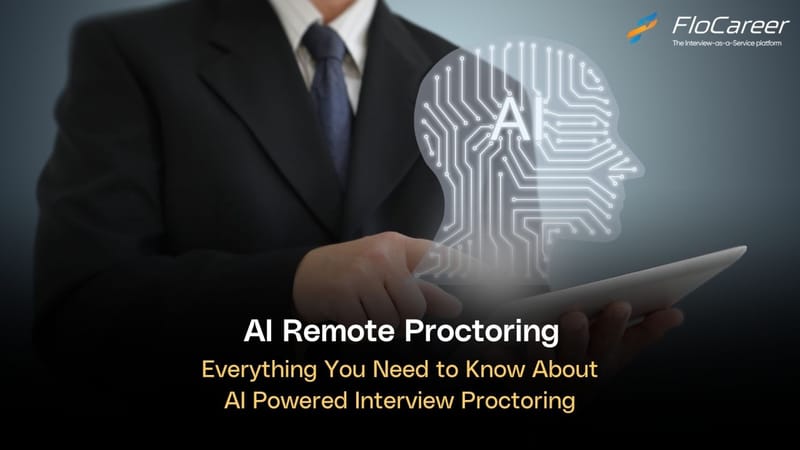The traditional method of in-person interviews has undergone a significant transformation with the rise of remote work. To maintain the integrity of the hiring process, interview proctoring emerged as a solution. Initially, human proctors monitored candidates via video calls, ensuring fair evaluation. However, the limitations of manual oversight, such as inconsistency and scalability, became apparent.
The advent of AI has ushered in a new era of interview proctoring. AI-powered remote proctoring systems (AIPS) have revolutionized the way candidates are assessed. These systems employ advanced algorithms to monitor candidate behavior, detect anomalies, and ensure a secure testing environment.

How AI-Powered Remote Proctoring Works
AI-powered remote proctoring involves a sophisticated system that continuously analyzes candidate activity during a virtual interview or assessment. Key components include:
- Identity verification: Using facial recognition, ID verification, or other biometric methods to confirm the candidate's identity.
- Environment scanning: Assessing the candidate's surroundings to detect any unauthorized materials or persons.
- Behavior analysis: Monitoring candidate actions, such as eye movements, keyboard strokes, and mouse activity, to identify potential irregularities.
- Anomaly detection: Employing AI algorithms to flag suspicious behavior, such as excessive screen sharing, unauthorized website access, or unusual audio patterns.
This comprehensive approach ensures a secure and fair testing environment, reducing the risk of cheating and enhancing the overall integrity of the hiring process.
The Role of AI in Enhancing Interview Integrity
AI-powered remote proctoring plays a pivotal role in upholding the integrity of the hiring process. By automating the monitoring process, AI systems can detect patterns of suspicious behavior that might go unnoticed by human proctors.
- Preventing cheating: AI can identify various cheating methods, such as using external resources, impersonation, or collusion.
- Ensuring fairness: By standardizing the evaluation process, AI helps eliminate biases and ensures equal opportunities for all candidates.
- Protecting company reputation: Safeguarding the integrity of the hiring process enhances the company's reputation as an employer of choice.
Ethical Considerations and Challenges
While AI-powered remote proctoring offers numerous benefits, it also raises ethical concerns and challenges:
- Privacy: Collecting and processing personal data requires stringent privacy measures to protect candidate information.
- Bias: AI algorithms must be carefully developed and tested to avoid biases that could unfairly disadvantage certain candidates.
- Candidate experience: It is essential to create a positive candidate experience while maintaining security.
- False positives: AI systems may occasionally flag legitimate activities as suspicious, leading to false accusations.
Addressing these challenges is crucial for the successful implementation of AI-powered remote proctoring.
Best Practices for Implementing AI-Powered Remote Proctoring
To maximize the benefits of AI-powered remote proctoring while mitigating risks, organizations should adhere to best practices:
- Choosing the right proctoring platform: Select a platform that aligns with organizational needs, offers robust AI capabilities, and prioritizes data security.
- Training proctors and candidates: Provide comprehensive training to proctors on using the platform and interpreting AI-generated alerts. Educate candidates about the proctoring process to alleviate anxiety and ensure a smooth experience.
- Ensuring accessibility: Implement measures to accommodate candidates with disabilities, such as providing alternative formats and assistive technologies.
- Adhering to data privacy regulations: Comply with relevant data protection laws, such as GDPR and CCPA, to safeguard candidate information.
- Continuous monitoring and improvement: Regularly evaluate the proctoring system's effectiveness, identify areas for improvement, and stay updated on AI advancements.
The Future of Interview Proctoring
The future of interview proctoring is bright, with AI playing an increasingly pivotal role. Advancements in AI technology will likely lead to more sophisticated proctoring systems capable of detecting even more subtle forms of cheating.
Integration with other HR tools, such as applicant tracking systems and hiring platforms like FloCareer, will streamline the hiring process further. Additionally, industry-wide standards and certifications for AI-powered proctoring may emerge to ensure quality and reliability.
The Growing Prevalence of AI in Proctoring
AI is rapidly gaining traction in the online proctoring industry. A recent study found that over 50% of remote proctoring sessions now incorporate some form of AI technology. This significant increase underscores the industry's recognition of AI's potential to enhance security and efficiency.
Breakdown of Proctoring Methods
The online proctoring market can be segmented into three primary categories:
- Live Online Proctoring (OLP): Accounts for 53% of the market. AI is often used as a support tool for human proctors.
- Recorded Proctoring: Comprises 25% of the market. AI plays a crucial role in reviewing recorded sessions for potential irregularities.
- Automated Proctoring: Represents 22% of the market and relies entirely on AI for monitoring and analysis.
Proctoring Models and AI Involvement
There are six primary models for AI involvement in online live proctoring (OLP):
- Unproctored: No proctoring, relying solely on ID verification.
- Proctor First: Human proctor with AI support.
- AI First: AI takes the lead with human oversight.
- AI Only: Fully automated proctoring.
- Record and Review: AI flags potential issues for human review post-session.
- Proctor the Proctor: AI monitors proctor performance.
These models illustrate the varying degrees of AI integration in the industry.
Closing Hook
AI-powered remote proctoring has transformed the landscape of interview and assessment processes. By effectively addressing ethical considerations, implementing best practices, and staying abreast of technological advancements, organizations can leverage this technology to enhance hiring efficiency, security, and fairness.
As AI continues to evolve, it is essential to prioritize the human element, ensuring that proctoring systems are used to augment, rather than replace, human judgment.
By striking a balance between technology and human expertise, organizations can create a robust and equitable hiring process. FloCareer is the end-to-end hiring partner right from the strategic hiring plan to the post candidate interview process, to ensure everything done is 100% fair, transparent and secure.
Schedule a call with our sales reps today and get the best crew onboarded!
Stay tuned for more.


